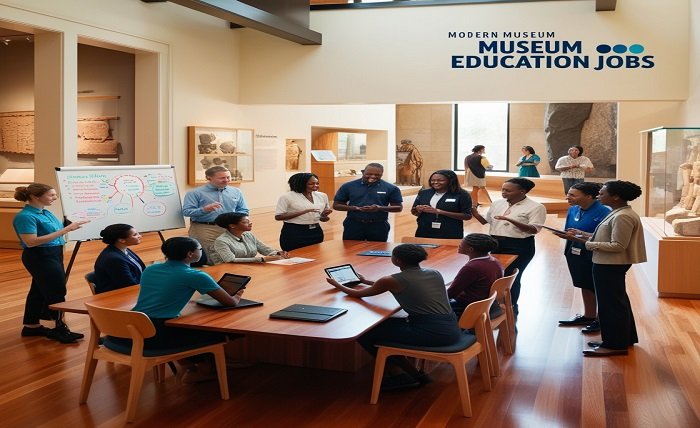museum education jobs are becoming more and more common, providing fascinating employment options for people who are enthusiastic about art, history, culture, and education. Museums are important to society because they serve as hubs for education and interaction in addition to being stores of artifacts. Creating meaningful experiences for visitors of various ages, backgrounds, and learning styles is the goal of education at museums, which goes beyond simply leading tours.
What Are Museum Education Jobs?
Teaching, leading, and curating educational events and programs in a museum context are all part of museum education jobs. Engaging visitors, assisting them in connecting with exhibitions, and improving their comprehension of art, history, culture, and science are the goals of these roles. Tours, workshops, interactive activities, digital materials, and special events are just a few of the ways museum educators engage audiences.
Job Types in Museum Education
The field of museum education jobs has many different job titles. While some include research, administrative tasks, or program planning, others concentrate on face-to-face engagement with guests. Some of the important positions are listed below:
Museum Instructor
The task of creating and providing educational programming for all kinds of museum visitors falls to museum education jobs. They might design curriculum, provide public events, lead school tours, or provide volunteer and docent training.
Education Curator
A museum education jobs is supervised by an education curator. To make ensuring that educational goals are in line with the museum’s overarching mission, they supervise the creation and execution of educational initiatives, manage employees and volunteers, and collaborate closely with curators and exhibit designers.
Skills Needed for Jobs in Museum Education
museum education jobs demand a combination of specific expertise, effective communication, and inventiveness. Some of the essential abilities that are widely sought after in this sector are listed below:
Proficiency in Communication
Proficiency in both written and spoken communication is crucial. Writing blog articles and newsletters, creating educational materials, or leading tours all require the ability to effectively and captivatingly convey complicated topics.
Understanding of Museum Exhibits and Collections
It is essential to have a thorough awareness of the museum’s holdings and displays. Depending on the museum’s concentration, this can contain knowledge about history, art, or science. You ought to be able to use this information to create instructive materials that appeal to users of all ages and backgrounds.
Qualifications and Education
Depending on the position and museum, different degrees are needed for museum education jobs. A bachelor’s degree in a related discipline is, nevertheless, required for the majority of jobs. The following are a few of the most pertinent degrees:
History, Art History, or Cultural Studies: Good for jobs in museums of art or history.
Education: Especially important for anyone who want to create educational materials or instruct in a museum environment.
Museum Studies: A specialist degree that blends educational theory with expertise in museum operations.
Science, Anthropology, or Archaeology: Relevant for museums that focus on natural history or scientific collections.
Career Routes and Promotion
Career options in museum education jobs range from entry-level positions like assistant educator or docent to more senior ones like museum director or curator of education. Gaining experience, earning further degrees or certificates, and broadening your skill set are usually necessary for advancement in museum teaching. Additionally, museum educators can pursue careers in administration, curatorial work, or even museum leadership.
How to Begin Teaching in Museums
Although beginning a museum education jobs can be challenging, there are a few tactics you can employ to improve your chances of success:
Intern or Volunteer
Numerous museums provide volunteer or internship opportunities, which can be excellent ways to obtain practical experience and build important professional networks. Gaining experience as an educational assistant or docent will help you understand the daily tasks that museum education jobs.
Make Connections with Museum Experts
In the museum industry, establishing a professional network is essential. To network with professionals and find out about employment openings, go to museum conferences, join pertinent associations (like the American Alliance of Museums or the museum education jobs Roundtable), and take part in online forums and social media groups.
Jobs in Museum Education’s Future
The future of museum education jobs bright as long as museums continue to adjust to the digital age and audience expectations. New positions and opportunities in the sector are probably going to be created by the growing use of technology, interactive exhibitions, and virtual programs. Additionally, museum educators will be crucial in making sure that museums achieve their objectives of becoming more accessible and inclusive.
Conclusion
For people who are enthusiastic about education, culture, and the arts, museum education jobs provide a fulfilling profession. The prospects in this industry are numerous and diverse, whether you’re designing educational programs, organizing tours, or producing digital material. You can start a rewarding career in museum education by accumulating experience, connecting with industry experts, and keeping up your education. Learn more about: bosturf
FAQ
Does employment in museum education require a degree in museum studies?
Although a degree in museum studies is beneficial, degrees in history, art history, education, or cultural studies are often accepted for many museum education jobs. Experience working in museums, teaching, or schooling might also be beneficial.
Can I volunteer for museum education positions?
Indeed, a lot of museums have volunteer opportunities, which can be a great way to develop your portfolio and obtain experience. Additionally, some museums provide honoraria or stipends for certain volunteer positions.
What prospects exist for employment in museum education?
As museums increase their educational programs and digital capabilities, museum education jobs are expected to develop. But because the employment market can be competitive, it’s important to get experience through voluntary work or internships.

